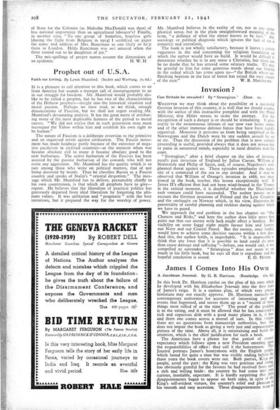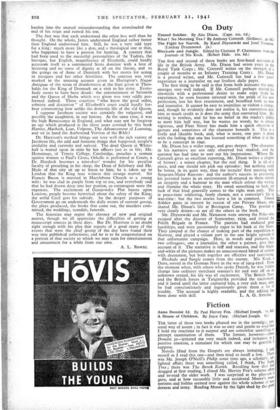James I Comes Into His Own
A Jacobean Journal. By G. B. Harrison. (Routledge. 16s, 64-) IN this book Dr. Harrison carries on the plan of his own which he developed with his Elizabethan journals into the first years of James's reign. It is a curious plan, of which very precise historians may not exactly approve. Dr. Harrison ransacks the contemporary authorities for accounts of interesting and odd events that happened, and serves them up as a " record of those things most talked of at the time." The proof of the pudding is in the eating, and it must be allowed that he has concocted a rich and capacious dish with a good many plums in it, if here and there one comes across a morsel of suet. In this volume there are no quotations from manuscript authorities, but that does not impair the book as giving a very just and representative picture of the time. Above all, it is entertaining and holds the attention, which is the chief justification for such a book. The Americans have a phrase for that period of mutual expectancy which follows upon a new President -entering uP°!1 the responsibilities of office : they call it the honeymoon. This Journal portrays James's honeymoon with the English peoPlc, which lasted for quite a time but was visibly ending before the three years the book covers were out. Both parties, King a" people, acted the part : the King was very gracious and lova& too obviously grateful for the favours he had received from such a rich and willing bride: the country he had come into !elf curious, insatiable, expectant. It is hardly surprising that little disappointments began to appear on both sides, in spite of the King's self-evident virtues, the country's relief and pleasure It his smooth and easy accession. These disappointments were to
harden into the mutual misunderstanding that overclouded the end of his reign and ruined his son.
The fact was that each understood the other less well than he thought. On the whole, James understood England rather better than England understood him. Still, he was a very odd type for a king : much more like a don, and a theological one at that, who happened to have a passion for hunting. A country that had been used to the masterful personalities of he Tudors, the baroque, but English, magnificence of Elizabeth, could hardly accustom itself to a sentimental Scots dominie with a love of lecturing and no sense of dignity at all on the throne, and to the goings on of Anne of Denmark with her mania for acting in masques and her other frivolities. The contrast was very marked in the amusing account given in Harington's Nugae Antiquae of the scene of drunkenness at the feast given at Theo- balds for the King of Denmark on a visit to his sister. Every- body seems to have been drunk : the entertainment of Solomon and the Queen of Sheba which was given was very oddly per- formed indeed. Those courtiers " who knew the good order, sobriety and discretion " of Elizabeth's court could hardly for- bear commenting how unlike the domestic life of the old Queen.
I suppose Jacobean society was certainly the vulgarest, and possibly the naughtiest, in our history. At the same time, it was the high Renaissance in England, and what may not be forgiven an age which produced in the three years covered by this book Hamlet, Macbeth, Lear, Volpone, The Advancement of Learning, and set in hand the Authorised Version of the Bible?
Dr. Harrison's method brings out very well the rich variety of Jacobean life, the odd and fantastic things that happened, people's credulity and curiosity and naiveté. The dead Queen at White- hall is waited upon in state by her officers just as in life; Mr.. Hemmings, of Trinity College, Cambridge, preaches a sermon against women at Paul's Cross; Othello is performed at Court; a Dr. Haydock becomes a nine-days' wonder for his peculiar faculty of preaching in his sleep; the Dean of Salisbury and Mr. Hyde of that city sit up to listen to him; he is taken up to London that the King may witness this strange marvel. Sir Francis Bacon is married ht Marylebone Church to a young wife : he was clad in purple from top to toe, and everybody said that he had drawn deep into her portion, so extravagant were the expenses. The excitement of Gunpowder Plot bursts upon London; people become hysterical about the safety of the King; the artful Cecil gets his subsidy. So the deeper purposes of Government go on underneath the daily events of current gossip, the plays produced, the books that come out, the murders com- mitted, the weddings, scandals, funerals.
The historian may regret the absence of new and original matter, though we all appreciate the difficulties of getting at manuscript sources in these days. But Dr. Harrison is no doubt right enough with his plea that reports of a good many of the events that were the chief gossip of the day have found their way into published collections; and he is to be congratulated on a portrait of that society to which we may turn for entertainment and amusement for a while from our own.
A. L. Rowsa.































 Previous page
Previous page